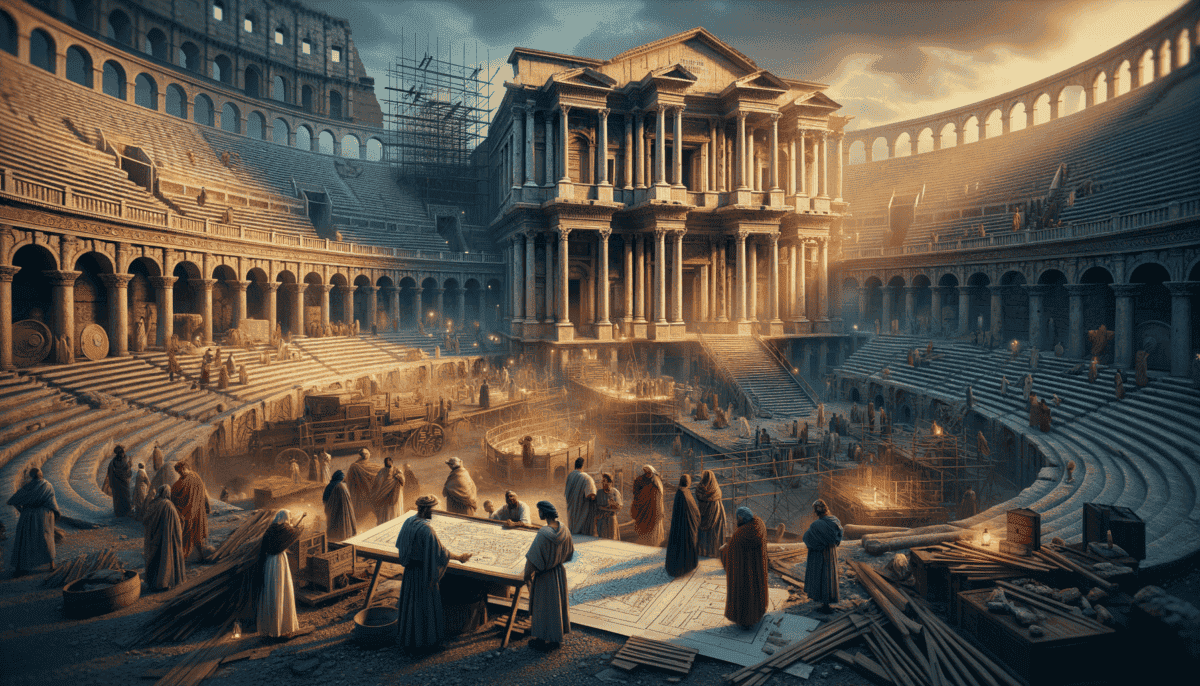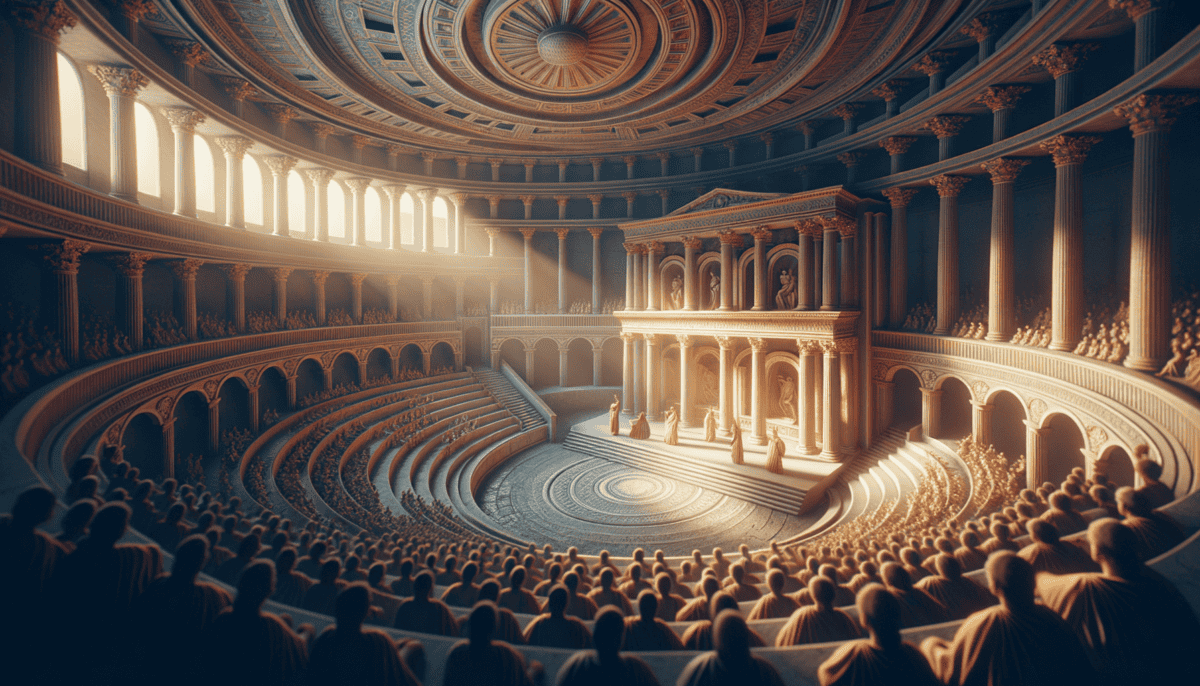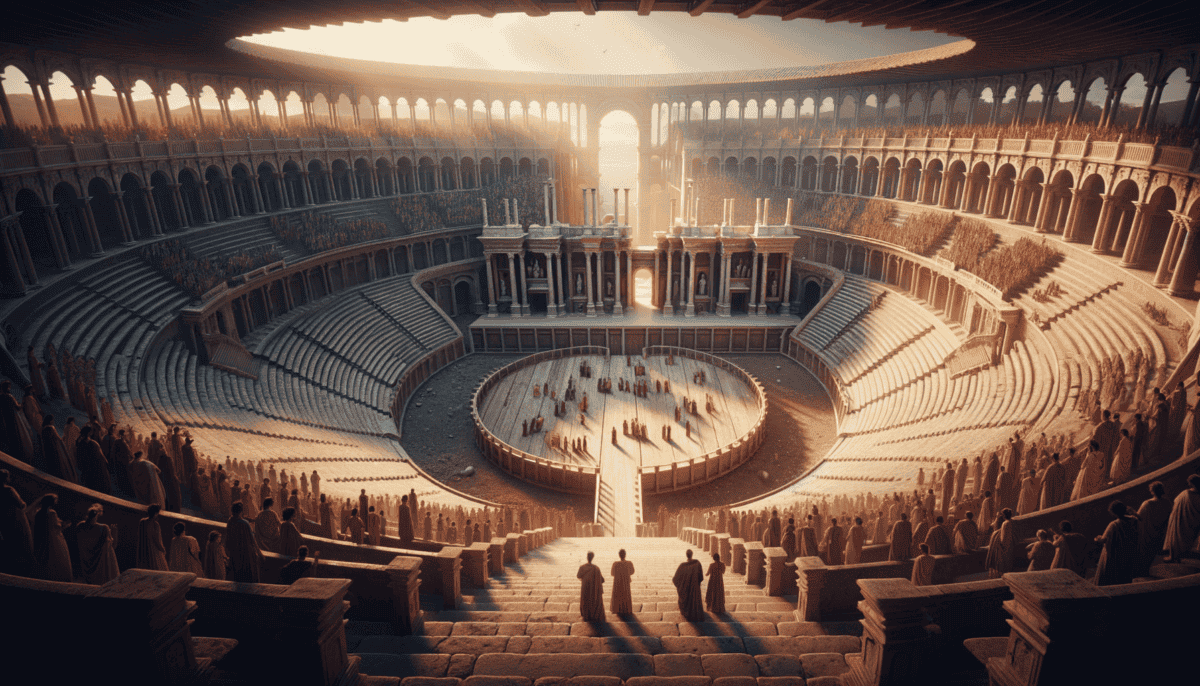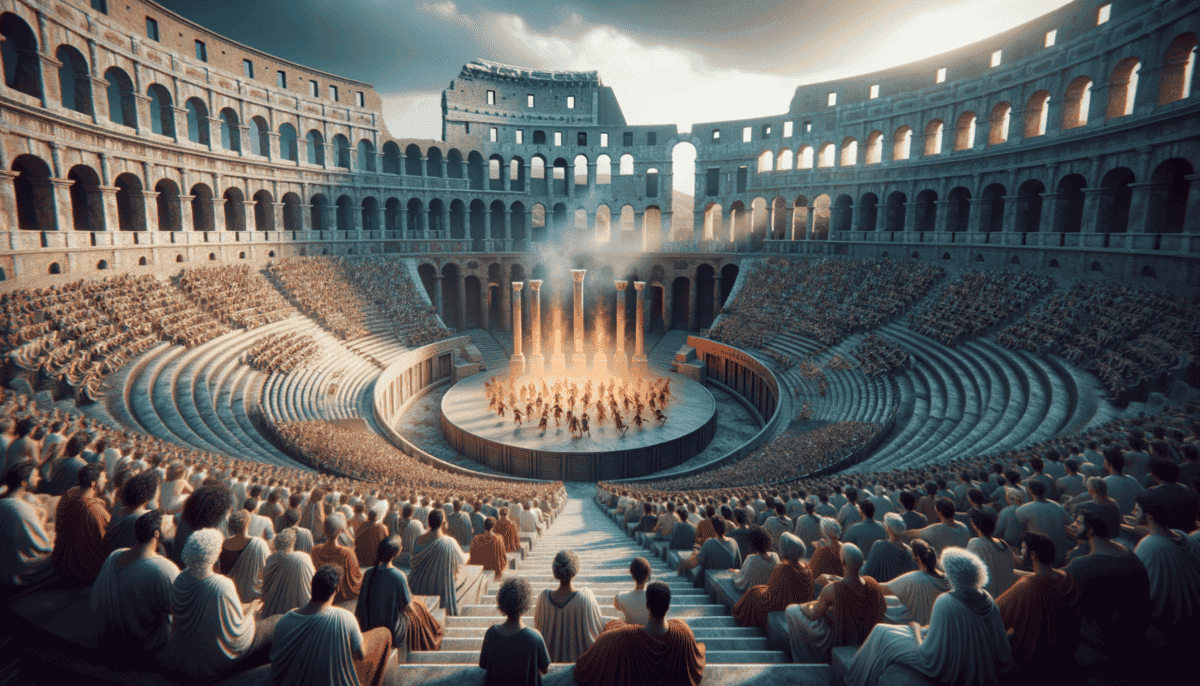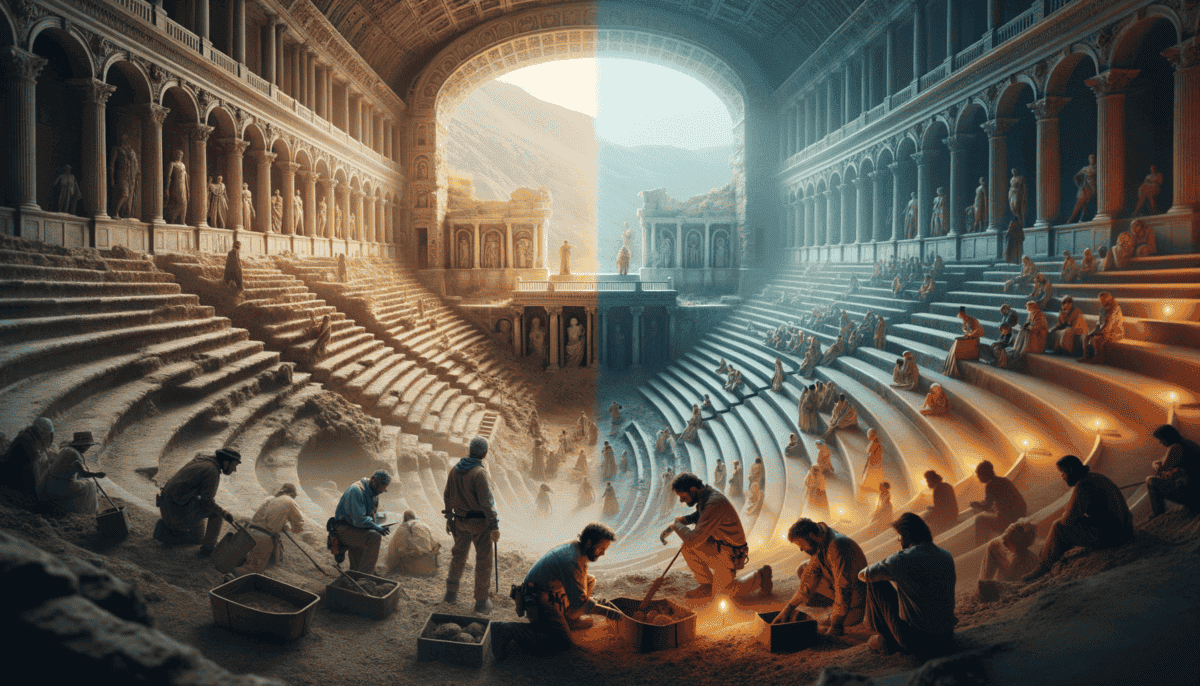The Birth of Roman Theater
Marcus stood at the edge of the wooden stage, his small hands gripping the rough planks. The year was 240 BCE, and Rome was about to witness something amazing.
"Look, father!" Marcus pointed excitedly. "They're building it just like you said!"
Workers scurried around, hammering and lifting wooden beams. The temporary theater was taking shape on the grassy hillside. It wasn't fancy like the Greek theaters, but it would work just fine for the upcoming festival.
A New Kind of Show
"You see, Marcus," his father explained, "our plays used to be very simple. Just funny dances and songs to make the gods happy. But now we're trying something new!"
The Romans loved watching shows. At first, they only had small plays with dancing and singing. These were called "ludi" – special games to honor the gods. But everything changed when they saw how the Greeks did theater.
Building the Stage
The wooden stages were special. They had:
• A big platform for actors
• Steps leading up from the ground
• A place for people to sit on the hillside
• Colorful curtains for backgrounds
"Why don't we build it to stay forever?" Marcus asked, watching the workers secure another beam.
His father laughed. "The senators think permanent theaters might be dangerous. They worry people might get too excited about plays and forget about important things!"
A Special Day
The air buzzed with excitement as more people gathered to watch the construction. Soon, actors would wear bright masks and tell stories about heroes, gods, and funny situations. The wooden benches would be filled with happy Romans, all enjoying the show together.
Marcus could smell the fresh-cut wood and hear the hammering sounds. "Will there be music too?" he asked hopefully.
"Of course! We have special instruments – flutes and drums. They help tell the story and make everything more exciting!"
"O citizens of Rome, gather near!
A tale of wonder you shall hear!"
More Than Just Fun
These early shows were important. They helped people learn about right and wrong. They made people laugh and think. Sometimes, they even taught lessons about being good citizens.
"Father," Marcus tugged at his toga, "will I get to be in a play someday?"
"Perhaps, my son. Theater is becoming part of who we are as Romans. It helps us tell our stories and remember what matters most."
As the sun began to set, the wooden theater stood ready for tomorrow's performance. Marcus couldn't wait to see the actors in their colorful masks, hear the music, and feel the excitement of the crowd.
The stage was set for something new in Rome – a place where stories would come alive, where people would laugh and cry together, and where a young boy's imagination could soar with the tales of gods and heroes.
Little did Marcus know that this simple wooden structure was just the beginning. Roman theater would grow into something much bigger and more amazing than anyone could imagine.
Building Better Theaters
The sun rose over Rome’s first stone theater. Marcus, now grown up, watched in awe as workers put the final touches on the magnificent structure. It was 55 BCE, and things were very different from the wooden stages of his childhood. ️
A Theater That Stays
“It’s beautiful, isn’t it?” said Claudia, Marcus’s daughter, her eyes wide with wonder.
“Yes, little one. And this one won’t come down after the shows end. It’s here to stay!”
New and Improved
The stone theater had special features that made it better than the old wooden ones:
- Strong stone walls that wouldn’t fall down
- Comfortable stone seats for everyone
- A beautiful decorated wall behind the stage
- Secret passages for actors to use
- Special spots for important people to sit
“Look at that wall behind the stage,” Marcus pointed. “That’s called the Scaenae Frons. It’s like having a giant dollhouse as the background!”
Smart Building Tricks
The Romans were very clever builders. They used special tricks to make the theaters strong and beautiful:
A worker explained to Claudia: “We use round arches to make the building strong. And see those columns? They help hold everything up while looking pretty too!” ️
“But Father,” Claudia asked, “how will everyone hear the actors?”
Marcus smiled. “The builders thought of that too! The shape of the theater helps voices travel all the way to the back rows. It’s like magic!” ✨
A Place for Everyone
The new stone theaters were special because they brought all kinds of people together:
“Rich or poor, everyone gets to enjoy the shows. The seats at the bottom are for important people, and others sit higher up. But everyone can see and hear everything!”
More Than Just Plays
The new theater wasn’t just for plays anymore. It became a place where people could:
• Watch amazing shows
• Meet their friends
• Learn about new ideas
• See important people make speeches
• Celebrate special days
“Will this theater last forever?” Claudia wondered, touching the cool stone walls.
“It might! That’s why we built it with stone instead of wood. These theaters will tell our stories for many, many years to come.”
As they walked through the grand entrance, Marcus remembered the wooden stages of his childhood. How far they had come! Now Rome had theaters that would amaze people for centuries.
The stone theaters were just the beginning. Soon, Rome would build even bigger and better places for shows. But that’s another story…
Theaters and Power
Marcus and Claudia were back at the theater, but today was different. Emperor Augustus himself was coming to watch the show!
A Special Day
“Why is everyone so excited, Father?” Claudia asked, watching people rush around with decorations.
“The Emperor uses theaters to talk to the people,” Marcus explained. “It’s like a big meeting place where he can make everyone happy.”
The Emperor’s Big Show
The theater looked extra special today:
Golden decorations sparkled everywhere
Purple curtains hung from the walls
Flowers filled the air with sweet smells
Guards stood at every door
“Look!” Claudia pointed to a fancy chair in the front row. “Is that where the Emperor sits?”
“Yes, that’s his special seat. From there, he can see everyone, and everyone can see him!”
Mixing Shows and Rules
The day’s events were exciting:
First came funny plays that made everyone laugh. Then the Emperor gave a speech about new rules for Rome. After that, dancers and musicians performed beautiful shows.
“The people seem so happy,” Claudia noticed.
“That’s what the Emperor wants,” Marcus whispered. “Happy people make a happy city.”
Everyone Has a Part
Different people had different jobs in the theater:
- Actors told stories through plays
- Musicians played happy songs
- Guards kept everyone safe
- Workers handed out free treats
- The Emperor made important announcements
A guard explained: “The theater is like a little Rome. Everyone has their place, and everyone plays their part.”
Theater Messages
The plays told special stories:
“See how the good person in the play follows the rules?” Marcus asked.
“And gets rewarded!” Claudia added.
“That’s right. The shows teach people how to be good Romans.”
Sometimes actors would tell stories about:
• Brave Roman heroes
• Kind and wise rulers
• People who helped their city
• The greatness of Rome
A Big Family
“The theater makes everyone feel like one big family,” Marcus said as they watched the final show.
Claudia smiled. “Is that why the Emperor comes here?”
“Yes, little one. In the theater, he’s like a father watching over all his children.”
As the sun set, colorful lights filled the theater. Music played, people cheered, and for a moment, everyone – rich and poor, powerful and common – shared in the magic of the Roman theater together.
Building the Perfect Sound
Today, Marcus and Claudia watched workers build a new part of the theater. They were amazed by all the clever tricks the Romans used! ️
Sound Magic
“Father, why are they putting those bronze pots in the walls?” Claudia asked, pointing to workers high up on scaffolds.
“Those are special sound pots,” Marcus explained. “They make voices bounce around the theater like magic!”
Smart Building Tricks
The builders showed Marcus and Claudia their special tools:
Measuring ropes to make perfect circles
Level tools to keep things straight
Big wooden frames to support heavy stones
Special lifting machines called pulleys
“Look how many people can sit here!” Claudia gasped, counting the rows of seats.
“This theater can hold 20,000 people – that’s like having ten big schools all in one place!”
Making Things Strong
The builders used special tricks to make the theater strong:
- Thick stone walls that curve like a rainbow
- Strong arches that hold up heavy rocks
- Deep foundations that go into the ground
- Special cement that gets harder with time
- Clever supports that share the weight
The head builder said: “We build theaters to last forever. Even your grandchildren’s grandchildren will watch shows here!”
Perfect Sound Design
Marcus showed Claudia how sound moved in the theater:
“Stand here and whisper,” he said. Claudia whispered hello, and her voice flew all the way to the top seats! Even people far away could hear everything clearly.
Smart Math at Work
The builders used numbers for everything:
“Each step must be just right,” the builder explained. “Too tall, and people trip. Too short, and they can’t see well.”
“It’s like a giant puzzle!” Claudia said.
Testing Things Out
Before finishing, the builders did fun tests:
A man dropped a coin at the bottom – everyone could hear it clink!
Singers tried different spots to find the best place to stand.
Workers clapped their hands to check how sound moved around.
“Our theaters are better than any others,” Marcus said proudly. “We use the best ideas from math and science to make them perfect!”
As they walked home, Claudia looked back at the giant theater. “It’s like a big musical instrument,” she said, “but made of stone!”
Marcus smiled. “Yes, and soon it will be filled with the happy sounds of people enjoying shows together.”
The sun was setting behind the theater, making the stone glow orange. Tomorrow, more workers would come to add finishing touches to this amazing building – one of the many engineering marvels of Ancient Rome.
Fun and Games at the Theater
The big day had finally arrived! Marcus and Claudia were so excited to see their first show in the new theater.
A Special Day
“Look at all the people!” Claudia squealed, watching crowds fill the seats. The theater buzzed with happy voices.
“Everyone loves show day,” Marcus smiled. “Rich or poor, we all come together to have fun!”
Getting Ready for the Show
Claudia watched the actors put on colorful masks and costumes. Some wore happy faces, others wore sad faces. The masks helped people in the back rows see what was happening.
“Why do they wear such big masks?” Claudia asked.
“So everyone can see if they’re happy or sad, even from far away!” Marcus explained.
Special Theater Rules
Marcus taught Claudia about theater manners:
- Rich people sat in front rows
- Regular people sat in middle rows
- Women and children sat in back rows
- Everyone had to be quiet during shows
- Clapping showed you liked the show
“The emperor is here!” someone shouted. Everyone stood up and cheered as he walked to his special seat.
The Big Show
First came the funny play. Actors wore silly masks and made everyone laugh:
Actor 1: “Oh no, I lost my donkey!”
Actor 2: “Is that it wearing your best toga?”
Next was a serious play about brave heroes. The actors sang beautiful songs that filled the whole theater.
Special Effects
The theater had cool tricks:
• Trap doors for surprise entrances
• Machines that made thunder sounds
• Ropes to make actors “fly”
“It’s like magic!” Claudia gasped. ✨
Happy Crowds
During breaks, people ate snacks and talked about the show. Some danced to music played by musicians.
“This is better than any story I’ve ever heard!” Claudia said, munching on dried fruit.
The Grand Finale
As the sun set, colored fabrics were pulled over the theater to make shade. The final show was the most exciting:
Dancers spun in bright costumes
Musicians played loud drums
Singers filled the air with beautiful songs
The whole crowd clapped along!
Walking home under the stars, Claudia couldn’t stop talking about everything she’d seen.
“Can we come back tomorrow?” she asked hopefully.
Marcus laughed. “The theater will be here for many tomorrows. That’s why we built it so strong!”
A Gift That Lasts Forever
Years passed, and little Claudia grew up to be a teacher. Now she brings her own students to the grand theater!
Sharing the Magic
“This theater is very special,” Claudia tells her excited students. “It has been here since I was your age, and it will be here long after we’re gone.”
The Theater Lives On
Marcus, now with gray hair, still works at the theater. He smiles as he watches Claudia teach her students about the building he helped create.
“See those tall columns?” Claudia points. “They help make the sound bounce so everyone can hear. The Romans were very smart builders!”
Modern Day Magic
Today’s theaters still use ideas from Roman times:
- Sloped seating so everyone can see
- Round shapes for good sound
- Special places for actors to enter
- Beautiful decorations
- Covered areas for shade
“Even after all these years,” Marcus tells the children, “people still love coming here to watch shows, just like they did in ancient Rome!”
A Special Discovery
One day, while cleaning, Claudia finds something special carved in the stone:
Built with love for the people of Rome
May our stories live forever ❤️
The Greatest Show
Claudia organizes a big celebration to honor the theater’s long life. Everyone from the city comes to watch:
• Dancers spin in bright clothes
• Musicians play old Roman songs
• Actors tell ancient stories
• Children perform new plays
A Forever Gift
As the sun sets, Marcus and Claudia sit together in their favorite spots.
“The Romans gave us more than just a building,” Claudia says. “They gave us a place to share our stories, forever.”
Marcus nods proudly. “And as long as there are stories to tell, theaters like this will always be filled with happy people.”
The theater stands strong against the evening sky, ready to welcome many more generations of storytellers and dreamers, just as it has for thousands of years.
And somewhere, the ancient Roman builders smile, knowing their gift of entertainment and joy continues to bring people together, just as they hoped it would. ⭐


